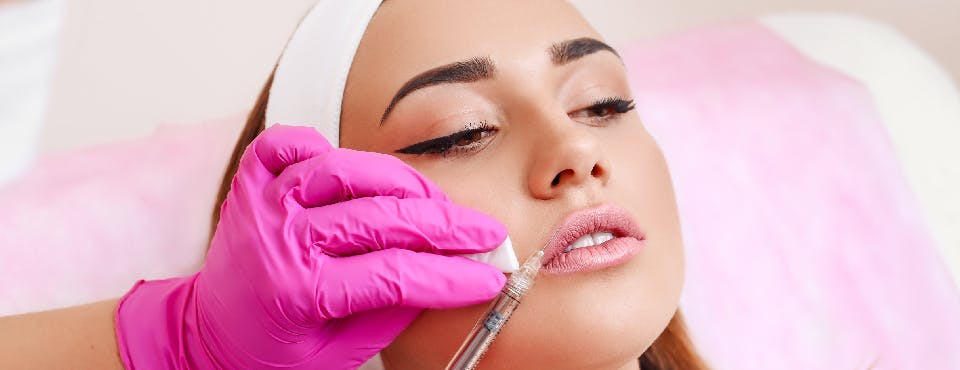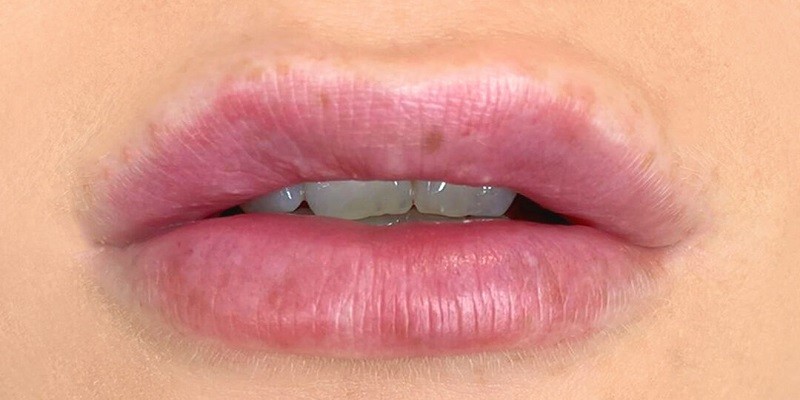Last Updated on June 18, 2025
If you’ve ever gotten a cold sore, you know how painful and unsightly they can be. But did you know that getting lip fillers can actually increase your risk of developing them? Cold sores are caused by the herpes simplex virus (HSV), which is the same virus that causes chickenpox and shingles.
When the HSV-1 virus is active, it can cause breakouts around your mouth or on your lips. And since lip fillers involve injecting material into your lips, there’s a higher chance of introducing the virus into your system if you have it. So what can you do to prevent cold sores after getting lip fillers?
There are a few things you can do to lower your risk of developing cold sores after getting lip fillers. First, make sure to tell your doctor if you have any history of cold sores or fever blisters. They may recommend using an antiviral medication like acyclovir (Zovirax) before and after your procedure to help reduce the chances of an outbreak.
You should also avoid touching or picking at your lips during the healing process, as this could introduce bacteria and increase your risk of infection. Finally, try to limit exposure to sunlight and other triggers that could activate the HSV-1 virus such as stress or illness.
- Avoid exposure to sunlight or other UV light sources for at least 2 weeks after your treatment
- This will help prevent the formation of cold sores
- If you experience any redness, swelling, or itching at the injection site, apply a cold compress and contact your doctor immediately
- Avoid touching or picking at the injection site as this can increase the risk of infection
- Keep the area clean and dry to prevent bacteria from developing and causing an infection
How to Treat Cold Sore After Lip Filler
If you’ve just gotten lip filler and have developed a cold sore, don’t freak out! Cold sores are common and can happen to anyone, even if you don’t have lip filler. The best thing to do is to start treating the cold sore as soon as possible.
There are a few different ways to treat cold sores. You can use over-the-counter medication like Abreva or docosanol cream, which can help shorten the healing time. You can also use oral antiviral medication, which will help reduce the duration and severity of the cold sore.
If your cold sore is particularly large or painful, you may want to see a doctor or dermatologist for additional treatment options. In some cases, they may prescribe a stronger antiviral medication or give you a corticosteroid injection to reduce inflammation. No matter what treatment you choose, it’s important to keep the affected area clean and dry.
Avoid picking at or touching the cold sore, as this can spread bacteria and delay healing. Apply an antibiotic ointment if there is any crusting or scabbing. And be sure to wash your hands after touching the sore!
With proper treatment, your cold sore should heal within 7-10 days. If it doesn’t seem to be improving after that time period, make an appointment with your doctor or dermatologist so they can check it out and rule out any other possible causes.

Credit: www.abreva.com
Why Do I Keep Getting Cold Sores After Lip Fillers?
If you’re wondering why you keep getting cold sores after lip fillers, there are a few possible explanations. First, it’s important to understand that cold sores are caused by the herpes simplex virus (HSV). This virus is very common and most people are exposed to it at some point in their lives.
However, not everyone who is exposed to HSV will develop cold sores. It’s thought that only about 20% of people who carry the virus will experience recurrent cold sores.
There are two types of HSV: HSV-1 and HSV-2.
Cold sores are usually caused by HSV-1, which is transmitted through contact with saliva or skin-to-skin contact with someone who has the virus. HSV-2 is typically transmitted through sexual contact and can cause genital herpes. However, both types of HSV can cause either type of infection depending on where they enter the body.
So why do some people get frequent cold sores while others only experience them occasionally? There isn’t a clear answer, but there are a few theories. One possibility is that certain lifestyle factors may trigger an outbreak in people who are prone to them.
These triggers can include stress, fatigue, illness, exposure to sunlight or windy weather, hormonal changes (such as during menstruation), and even eating certain foods (like chocolate or peanuts). If you notice that you tend to get cold sores after participating in any of these activities, try avoiding them if possible or taking steps to reduce stress levels in your life. Additionally, make sure to keep your lips moisturized and protected from harsh weather conditions since chapped lips can also trigger an outbreak.
Another possibility is that your body’s immune system may be weakend when you have lip fillers injected into your lips . This weakened state could allow the dormant HSV viruses present in your body to become active and cause an outbreak. If this is the case for you , talk to your doctor about ways to boost your immune system such as taking vitamins or supplements .
Additionally , consider getting lip fillers less often or switching to a different type of filler that doesn’t weaken the immune system as much .
How Long After a Cold Sore Can You Get Lip Filler?
It’s not uncommon to want to improve the appearance of your lips after suffering from a cold sore. After all, cold sores can be unsightly and make you feel self-conscious. You may be wondering how long you have to wait before getting lip filler after a cold sore.
The simple answer is that you should wait until your cold sore has completely healed before getting lip filler. This is because the injection site needs to be clean and free of any infection before the procedure can be performed safely.
However, it’s important to note that some people are more prone to developingcold sores than others. If you find that you frequently get cold sores, it may be best to avoid lip filler altogether as there’s a risk that the virus could spread to the injection site. If you do decide to get lip filler despite having a history of cold sores, be sure to let your doctor know so they can take appropriate precautions.
They may recommend using an antiviral medication prior to the procedure in order to reduce the risk of infection.
Can injecting lips trigger a cold sore, and what can we do about it? | Dr Tim’s Tips
Conclusion
Lip fillers are a popular cosmetic treatment that can give you fuller, plumper lips. However, one downside of lip fillers is that they can increase your risk of developing cold sores. Cold sores are caused by the herpes simplex virus and can be very painful.
Luckily, there are some things you can do to reduce your risk of developing cold sores after lip filler treatment.
First, make sure to avoid touching or rubbing your lips after treatment. This will help to prevent the spread of the herpes simplex virus.
Second, try using a lip balm or cream that contains sunscreen. This will help to protect your lips from the sun, which can trigger cold sore outbreaks. Third, if you experience any tingling or itching around your mouth, contact your doctor right away as this could be an early sign of a cold sore outbreak.
By following these tips, you can help to prevent cold sores after lip filler treatment.


